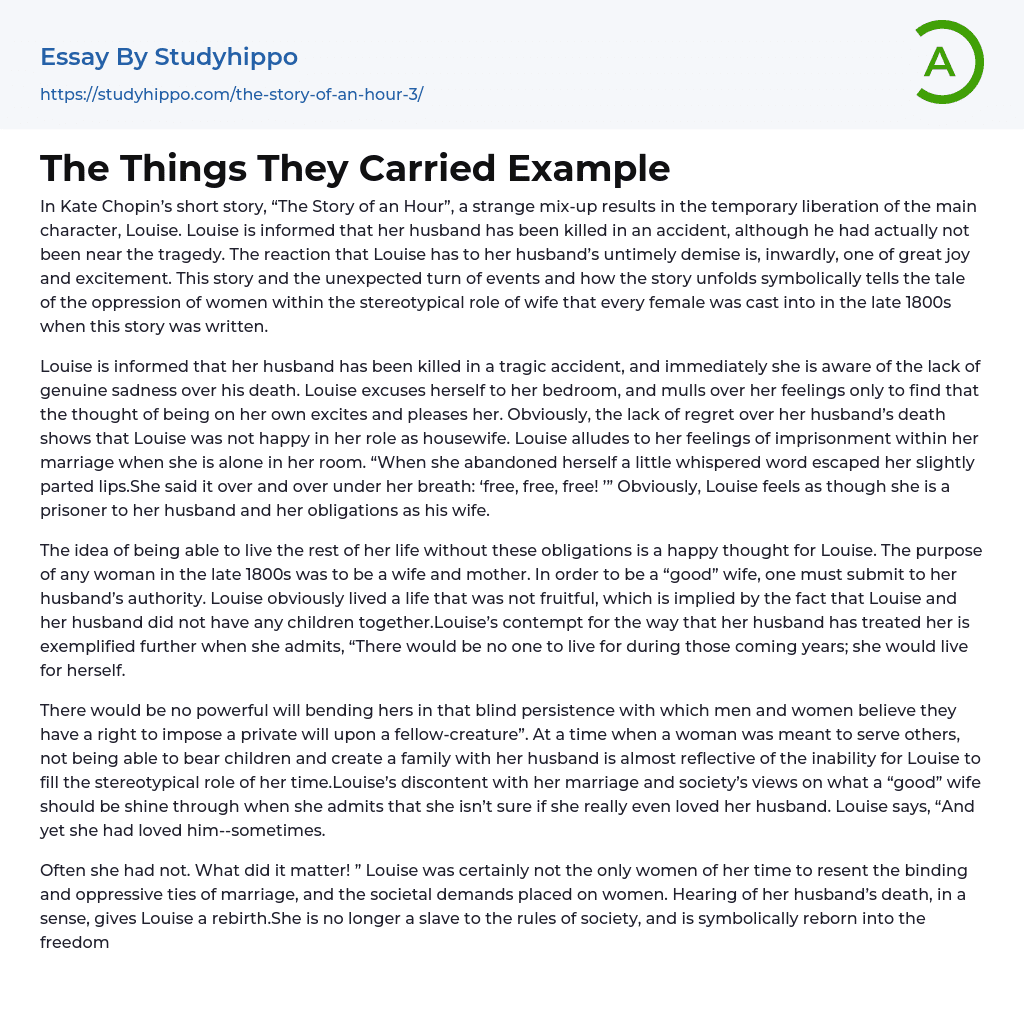The main character in Kate Chopin's "The Story of an Hour", Louise, experiences a moment of unexpected liberation due to a strange mix-up. Despite being falsely informed that her husband had died in an accident, Louise secretly rejoices at the news. The story is significant in its symbolic portrayal of the oppression of women during the late 1800s, when societal expectations cast all females into the stereotypical role of a wife.
Louise receives the news of her husband's tragic accident and is immediately aware of the lack of genuine sadness she feels. She retreats to her bedroom to reflect and discovers that the thought of being alone excites and pleases her, indicating her unhappiness as a housewife. In her solitude, she alludes to feeling imprisoned in her marriage and speaks a whispered word repeatedly under h
...er breath: "free, free, free!" - a clear indicator of her feeling trapped by her obligations as a wife.
The thought of not having to fulfill the obligations of being a wife and mother is a happy one for Louise, especially considering that during the late 1800s, every woman was expected to fulfill this traditional role. Being a "good" wife meant submitting to her husband's authority, but Louise had a life that was unfruitful, as evidenced by the absence of children in her marriage. She expresses her contempt for her husband's treatment of her by acknowledging that without him, she would have nobody to live for except herself during the remaining years of her life.
Men and women believe they have the right to force their personal will on others, but there would be no forceful will pushing against Louise's own desires.
In a time when women were expected to prioritize serving their families, being unable to have children or fit into the traditional wife role represents Louise's dissatisfaction. She reveals her discontent with both her marriage and society's expectations for women by confessing doubt about whether she truly loved her husband, despite past affection.
Similar to numerous women during her time, Louise disliked the limiting and oppressive aspects of marriage and societal expectations imposed on her. The demise of her spouse granted her a feeling of rejuvenation, liberating her from the constraints of social conventions. In her chamber, she observes the tree tops shaking with fresh spring vitality, symbolizing the new existence and liberty she obtained as a widow.
Louise, like many women in an era that prescribed a traditional housewife role, struggled with the demands of marriage. In "The Story of an Hour", Louise's enthusiasm for an opportunity to start anew without having to submit to male oppression is both symbolic and literal. Ironically, when Louise's apparently unharmed husband returns home, it is Louise who meets her demise. This represents the ultimate escape from masculine oppression presented in the story, implying that death was Louise's only way out of her unhappiness. In death, Louise finally found the freedom that a life of discontent could never offer her.
- Book Summary essays
- Metaphor essays
- Reader essays
- Rhyme essays
- Literary devices essays
- Villain essays
- Books essays
- Genre essays
- Literary Criticism essays
- Writer essays
- Protagonist essays
- Simile essays
- Poem essays
- Book Report essays
- Book Review essays
- Greek Mythology essays
- Plot essays
- Tragic Hero essays
- Coming of Age essays
- Play essays
- Rhetoric essays
- Rhetorical Question essays
- Translation essays
- Understanding essays
- Reason essays
- Character essays
- Letter essays
- American Literature essays
- Literature Review essays
- Utopia essays
- Poetry Analysis essays
- Dante's Inferno essays
- Between The World and Me essays
- Incidents in The Life of a Slave Girl essays
- Flowers for Algernon essays
- Myth essays
- Everyday Use essays
- Boo Radley essays
- Genesis essays
- Richard iii essays
- Alice in Wonderland essays
- On the road essays
- Ozymandias essays
- The Nightingale essays
- Holden Caulfield essays
- Animal Farm essays
- 1984 essays
- A Hanging essays
- Shooting An Elephant essays
- A Tale Of Two Cities essays




